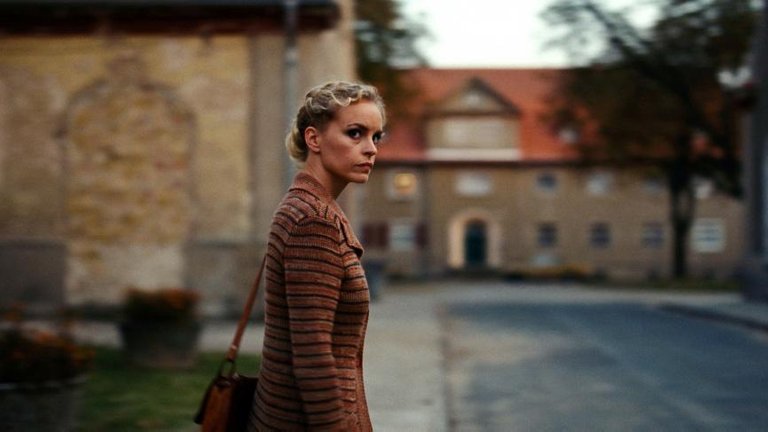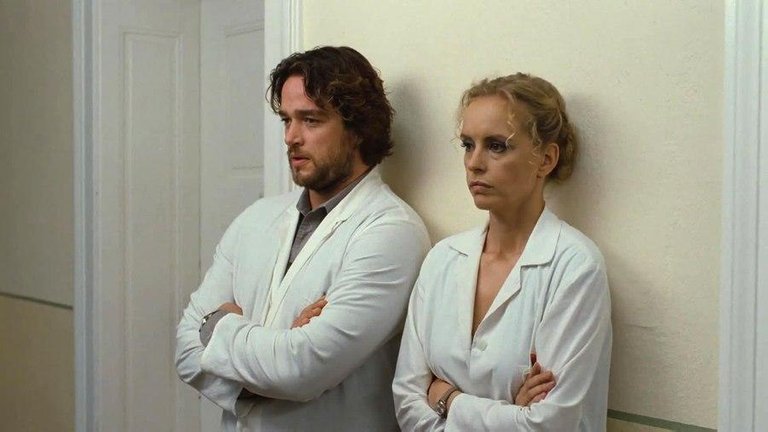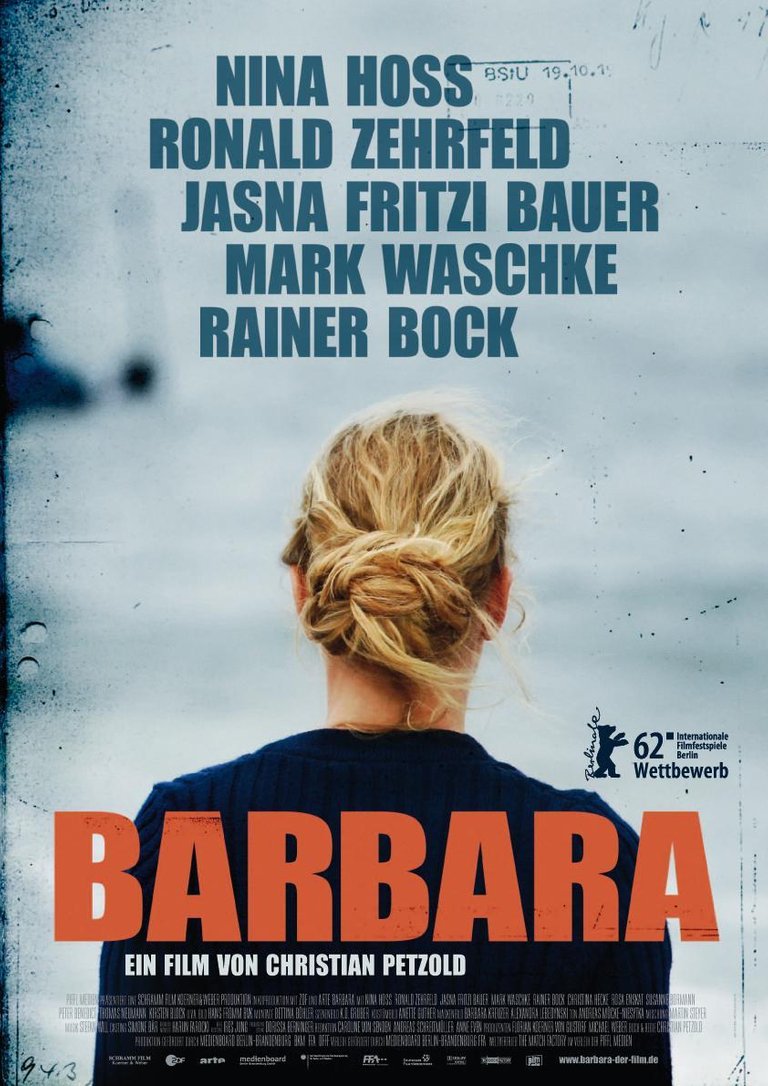Barbara (2012): a history of humiliations and suspicions | una historia de humillaciones y sospechas

Una película de Christian Petzold
Two weeks ago I posted a review of a German movie called Phoenix, directed by Christian Petzold and starring Nina Hoss and Ronald Zehrfeld. In the comments someone told me that she really liked those stories of the postwar period, of reconstruction and reintegration into society and of scenes in ruins. Thinking about that, I visited this other film by the same director and with the same leading duo, although set in a different time.
Hace dos semanas subí la reseña de una película alemana llamada Phoenix, dirigida por Christian Petzold y protagonizada por Nina Hoss y Ronald Zehrfeld. En los comentarios alguien me dijo que le gustaban mucho esas historias de la posguerra, de reconstrucción y reinserción en la sociedad y de escenarios en ruinas. Pensando en eso visité este otro film del mismo director y con la misma dupla protagonista, aunque ambientada en una época diferente.
While Phoenix takes place in the first years after the end of the Second World War, Barbara, released two years before that, takes place in the eighties. Also in Germany, or well in half of Germany.
Let us remember that the triumph of the allies against the Third Reich was due in large part to the fact that while the Western forces attacked the Nazis on the Western front, the Russians did the same on the Eastern front, generating a kind of joint liberation that later produced a political, territorial and ideological division between the countries of Eastern Europe (under Russian influence) and those of the West (liberated by the US and England). This division, which also caused what is known as the cold war, also brought a particular consequence and that is that Germany itself was divided; even its capital Berlin was divided for decades by a wall that kept the German Democratic Republic (GDR) on the Russian side and the Federal Republic of Germany (FRG) on the western side apart. As time went by, a great difference was perceived in the lifestyle of both sides, both in economic indicators and in the arts and individual liberties, themes that have been reflected in a great way in the cinema (especially the German cinema) in films like Werk ohne Autor and the classic Das Leben der Anderen.
Mientras que Phoenix transcurre en los primeros años después de terminada la segunda guerra mundial, Barbara, estrenada dos años antes que aquella, transcurre en los años ochenta. También en Alemania, o bueno en la mitad de Alemania.
Recordemos que el triunfo de los aliados frente al Tercer Reich se debió en gran parte a que mientras las fuerzas occidentales atacaron a los Nazis por el frente Occidental, los rusos hicieron lo propio por el frente Oriental, generando una especie de liberación conjunta que luego produjo una división política, territorial e ideológica entre los países del Este de Europa (bajo influencia Rusa) y los del Oeste (liberados por EEUU e Inglaterra). Esta división, que provocó además lo que se conoce como la guerra fría, también trajo una consecuencia particular y es que la propia Alemania se dividió; incluso su capital Berlín estuvo dividida durante décadas por un muro que mantuvo separadas a la República Democrática Alemana (RDA) del lado de los rusos y la República Federal de Alemania (RFA) del lado occidental. Conforme fue pasando el tiempo se fue percibiendo una gran diferencia en el estilo de vida de uno y otro lado, tanto en los indicadores económicos como en las artes y las libertades individuales, temas que han sido reflejados de gran forma en el cine (especialmente el cine alemán) en películas como Werk ohne Autor y la clásica Das Leben der Anderen.

It is in this context that in the eighties Barbara Wolff (Nina Hoss) is transferred from Berlin to a small provincial town in the GDR to work in a hospital for disciplinary reasons: she had requested permission to leave the country; what was considered almost a betrayal. This transfer constitutes a punishment for Barbara and a difficulty to leave the country because she begins to be watched by the Stasi (Ministry for State Security) who check her apartment (and her body) frequently.
Es en ese contexto en que en los años ochenta Barbara Wolff (Nina Hoss) es transferida desde Berlín hasta un pequeño pueblo de provincia de la RDA a trabajar en un hospital por razones disciplinarias: había pedido un permiso para salir del país; lo que se consideraba casi una traición. Esta transferencia constituye un castigo para Barbara y una dificultad para salir del país porque comienza a ser vigilada por la Stasi (Ministerio para la Seguridad del Estado) quienes revisan su depatamento (y su cuerpo) con frecuencia.
At the health center Barbara meets Andre (Ronald Zehrfeld), the head of the hospital, who soon begins to take an interest in her, but is also there as a measure of punishment for a mistake made in the past and is forced to pass reports to the Stasi in which he must also report on Barbara. Extreme surveillance, espionage and the diminution of individual liberties were taken by the Stasi and the GDR government for what they considered to be national security issues. It didn't matter that Barbara was a great doctor, with a great career, the simple fact of wanting to leave the GDR already made her suspect.
Immigration dramas are not new nor have they disappeared. When a person feels that they do not have quality of life or that they could be better off in another country, they leave their homeland and venture to another land. This is the case of the Cubans who cross to Miami, the Venezuelans who dispersed throughout the Southern Cone, the Europeans who crossed the Atlantic in times of war, but the biggest drama of the Germans who lived in the GDR is that they only wanted to cross towards the FRG: it was their own country, half their capital, half their homeland in which many of them had relatives whom they could not freely visit as often as they would have liked.
En el centro de salud Barbara conoce a Andre (Ronald Zehrfeld), el jefe del hospital, quien pronto comienza a interesarse por ella, pero también se encuentra allí como medida de castigo por un error cometido en el pasado y está obligado a pasar reportes a la Stasi en los cuales también debe informar sobre Barbara. La extrema vigilancia, el espionaje y la disminución de las libertades individuales fueron medidas tomadas por la Stasi y el gobierno de la RDA por lo que consideraban temas de seguridad nacional. No importaba que Barbara fuese una gran doctora, con una gran carrera, el simple hecho de querer abandonar la RDA ya la hacía sospechosa.
Los dramas migratorios no son nuevos ni han desaparecido. Cuando una persona siente que no tiene calidad de vida o que podría estar mejor en otro país, se va, deja su tierra natal y se aventura a otro suelo. Es el caso de los cubanos que cruzan a Miami, los venezolanos que se dispersaron por todo el cono Sur, los europeos que cruzaron el Atlántico en épocas de guerra, pero el mayor drama de los alemanes que vivían en la RDA es que sólo querían cruzar hacia la RFA: era su propio país, la mitad de su capital, la mitad de su patria en la que muchos de ellos tenían parientes a quienes no podían visitar libremente con la frecuencia que hubieran querido.

Barbara then has to behave, try not to be noticed, not attract attention in any way, not only to avoid further retaliation, but because she still wants to escape and has a plan for it. This personal drama of the protagonist, added to the story of the other characters, Dr. Andre, some patients and a girl named Stella, provide some with enough elements for the story to go towards a different ending than what we would have imagined at the beginning. With this film, Christian Petzold won the Silver Bear at the Berlin Film Festival (equivalent to the Best Director award) and other important nominations. The script is good, the story interesting (although slow for the taste of some) and the performances are very, very good, especially that of Nina Hoss who you may remember from my review of Phoenix or for having been Cate Blanchet's partner in the celebrated Tár. I've liked the two Petzold movies I've seen so far and from what I've been reviewing in his filmography, he has more interesting stories, several of them starring either Nina Hoss or what seems to be his new muse, Paula Beer, anyone? Have any of you seen other Petzold movies? which do you recomend me? I read you in the comments.
Barbara entonces tiene que portarse bien, tratar de pasar desapercibida, no llamar la atención de ninguna manera, no sólo para evitar mayores represalias, sino porque aún tiene deseos de escapar y tiene un plan para ello. Ese drama personal de la protagonista, sumado a la historia de los demás personajes, el Dr. Andre, algunos pacientes y una chica llamada Stella, dotan alguión de suficientes elementos para que la historia transcurra hacia un final diferente al que habríamos imaginado al inicio. Con esta película, Christian Petzold obtuvo el Oso de Plata en el Festival de Berlín (equivalente al premio a Mejor Director) y otras nominaciones importantes. El guión es bueno, la historia interesante (aunque lenta para el gusto de algunos) y las actuaciones son muy, muy buenas, especialmente la de Nina Hoss a quien quizás recuerden de mi reseña de Phoenix o por haber sido la pareja de Cate Blanchet en la celebrada Tár. Las dos películas que he visto de Petzold hasta ahora me han gustado y por lo que estuve revisando en su fimografía tiene más historias interesantes, varias de ellas protagonizadas bien por Nina Hoss o por la que parece ser su nueva musa, Paula Beer, ¿alguno de ustedes ha visto otras películas de Petzold? ¿cuál me recomiendan? Los leo en los comentarios.
Reviewed by | Reseñado por @cristiancaicedo
Other posts that may interest you | Otros posts que pueden interesarte:
  |
|---|



I'll be putting this on my list. Looks like something I'd love to watch.
Awesome. Let me know when you do it
Congratulations @cristiancaicedo! You have completed the following achievement on the Hive blockchain And have been rewarded with New badge(s)
Your next target is to reach 160000 upvotes.
You can view your badges on your board and compare yourself to others in the Ranking
If you no longer want to receive notifications, reply to this comment with the word
STOPCheck out our last posts:
I think I'm one of those who like this kind of post-war movies, the atmosphere where the story takes place is usually impressive, and the stories leave a lot to think about.🤗
I think it was you the one who said something like on that on my other post. That's why I watched this movie. Greetings.
oh, yes what a privilege thank you.❤️
wow, very good movie, if there is free time I also want to watch it
Hope you like it. Thanks for reading
SIEMPRE HE CONSIDERADO QUE LAS PRODUCCIONES QUE RELATAN EL DESARROLLO DE ALGÚN PERSONAJE O COMUNIDAD DESPUÉS DE LA GUERRA, LLEGAN A ROMPER AQUELLAS IDEALIZACIONES DE QUIENES FUERON LOS ENEMIGOS DEL EVENTO, CONSIDERANDO QUE LAS VERDADERAS VÍCTIMAS DE DICHAS GUERRAS NO SON QUIENES LA INICIARON, SI NO, LAS PERSONAS QUE CON SOLO TENER DICHA NACIONALIDAD, SON LIMITADAS A CONSTRUIR UN VERDADERO FUTURO QUE LOS AYUDE A PROGRESAR POR LA REPRESENTACIÓN QUE LE ETIQUETAN POR SU ORIGEN Y ESE ES UN TEMA CONTROVERSIAL. BUEN POST, SALUDOS.😁
Es cierto, la mayoría de las víctimas de las guerras normalmente no son quienes las iniciaron ni quienes disparan las armas sino los ciudadanos comunes. Saludos y muchas gracias por leerme.